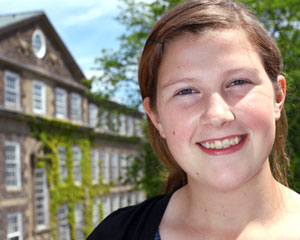 |
| Maggie Lovett is currently on her way to Ghana to assist with Unite for Sight (Bruce Bottomley photo) |
Maggie Lovett may be volunteering with Unite for Sight. But the Dal student says she hopes her own eyes are opened by her experiences in Ghana.
“I hope to get a better picture of global health issues,” says the fourth-year Biology (honours) student. “I’d like to go to medical school one day and I’d like to be a physician who can do these sorts of things, be a humanitarian doctor.
“So I’d like to get a better understanding of what it’s like on the ground.”
Ms. Lovett, 21, first heard about Unite for Sight – a U.S.-based non-profit organization working to improve eye health and eliminate preventable blindness – a couple of years ago.
Working with the group, which does outreach in Ghana, Honduras, and India, appealed to her, in large part because her own father lost his vision because of a degenerative eye disease.
“Vision is something that people often take for granted,” notes Ms. Lovett. “It’s only when it’s gone that you’re struck by how important it is – especially somewhere like Ghana where most people in the rural villages make their living by farming and textiles and craft-making, so vision is really important.”
Unite for Sight was founded in 2000 by Jennifer Staple-Clark, who was then a sophomore at Yale University. The agency has trained more than 4,000 volunteers and provided services to a million people worldwide, including more than 32,500 surgeries.
Ms. Lovett left Halifax June 14 and – after playing tourist for five days in London – will land in Accra, the capital city of Ghana, a nation on the western coast of Africa. From there she, along with other volunteers from across North America, will take a 12-hour van ride into Tamale, a northern city that will serve as their base.
The volunteers will work with a local eye clinic and its staff, including one ophthalmologist who used to go months without performing cataract surgery because residents living in extreme poverty could not afford it. Now, thanks to funding from Unite for Sight, he’s doing more than 2,200 of the procedures each year.
Ms. Lovett and her compatriots, with help from clinic staff, will do outreach in villages in northern Ghana. They’ll distribute eyeglasses and sunglasses, test vision and arrange for further treatment (and transportation) for people with cataracts, glaucoma or other eye disease.
“Cataract surgery is a really simple procedure,” she says. “It takes seven to 15 minutes, really, to have it done. Literally, the next day they can take off the bandages and see, which is pretty remarkable.”
To prepare for the mission, Ms. Lovett completed a series of online training modules, as well as a cultural sensitivity program, and shadowed the staff at Doctors Eye Clinic in Spryfield.
She’s been a regular volunteer with the Halifax Sexual Health Clinic and an animal shelter in Dartmouth – she’s active in Dal’s student union and was recently elected a senator, too – but her first global volunteer opportunity was a welcome one.
“The furthest I’ve ever been is Ontario, so it’s a big leap,” she says. She will return to her summer job in a neuroscience lab at Dal after three weeks in Ghana.
She paid her own airfare and lodging and also put a lot of effort into fundraising. Her goal was $2,000, which she figures will pay for 50 cataract surgeries.
“One of the things I really love about Unite for Sight is that this money that’s donated, 100 per cent is going to the patient,” Ms. Lovett points out.
You can make a donation, and read about her adventure, through her blog:
